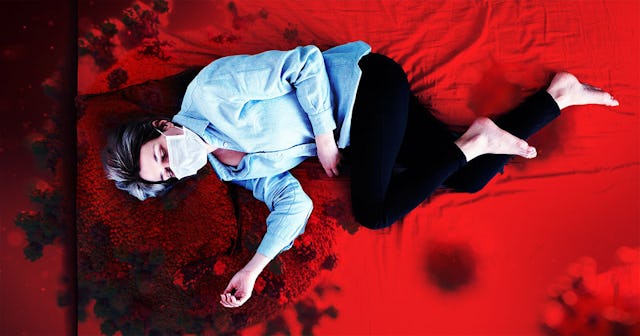What Is COVID-Somnia?

There’s no doubt that the pandemic has affected our sleep. In the earliest months of the pandemic, many of us were experiencing vivid, often disturbing dreams. In April last year, the New York Times reported that the Google query “why am i having weird dreams lately” had quadrupled.
As the pandemic has evolved, it seems so has its effect on our sleep. Nightmares aren’t the only issue many of us are struggling with at night. The American Academy of Sleep Medicine (AASM) surveyed 2,006 adults in the U.S. and found that more than half were experiencing COVID-somnia. Respondents reported that they were suffering from a variety of increased sleep disturbances, including problems falling or staying asleep, sleeping less, experiencing worse quality sleep, and having more disturbing dreams.
In an interview with MedPage Today, Michael Grandner, PhD, spoke about the connection between the pandemic and sleep. He highlighted that one of his main overarching concerns was that people’s sleep troubles, namely insomnia, would cross the line from an acute symptom to a chronic disorder. He noted that it’s common to lose sleep over something sometimes, but after a sustained period of insomnia, the condition becomes chronic. Folks can inadvertently train themselves to be unable to fall asleep. Chronic insomnia typically is associated with trouble sleeping at least three times a week for at least three months.
Most At-Risk Groups For COVID-Somnia
Insomnia can affect anyone. However, there are some groups who have been more affected by COVID-somnia than others, according to Grandner. They include younger folks — sleep disturbance seemed to affect adults aged 35-44 at the highest rates — women, folks whose mental health suffered during the pandemic, and folks whose physical health suffered, whether because they got more sedentary or engaged in less healthy behavior.
Healthcare workers have also been significantly impacted. A study from the University of Ottawa that analyzed the rise of insomnia, depression, anxiety and post-traumatic stress disorder (PTSD) since the beginning of the pandemic found that, of all the disorders, insomnia saw the biggest spike of about 24 percent.
Dr. Steven Altchuler, a psychiatrist and neurologist who specializes in sleep medicine at the Mayo Clinic confirmed that, “If you’re having insomnia, you’re in good company — much of the world is, too. It’s a consequence of all the changes we’re experiencing in Covid.”
That’s probably not much comfort for those who are experiencing insomnia, but there is some (small) comfort in knowing you’re not alone.
Treatments For Insomnia
With the struggle for sleep comes the search for a solution. More people are turning to sleep aids to help them fall and stay asleep. The AASM found that 51% of survey respondents reported using medication, over-the-counter supplements, or other substances to help them fall asleep. 68% reported that they’ve been using sleep aids more frequently. A mere five percent of those who reported using sleep aids said they “use them rarely.”
“Medicinal sleep aids should be used cautiously for people with sleep problems and should always be used in consultation with a medical provider,” cautioned Dr. Fariha Abbasi-Feinberg, a sleep medicine physician in Fort Myers, Florida, and member of the AASM board of directors. “Many patients find that appropriate sleep hygiene will help them get better sleep, while those with chronic insomnia will benefit from cognitive behavioral therapy for insomnia, which includes strategies such as stimulus control, sleep restriction and relaxation therapy.”
Dr. Grandner also highlighted cognitive behavior therapy (or CBT) for insomnia. He noted that CBT has been well-studied and, compared to medications, CBT does as well or better, especially for the long-term. He also highlighted that there’s “some evidence” that CBT over telehealth works just as well as in person, depending on how it’s delivered. “It’s as good or almost as good,” he confirmed in his Facebook Live Interview. According to Dr. Grandner, patients can begin to see results in as little as a few weeks, typically six to eight sessions.
Healthy Sleep Habits To Practice
Dr. Grandner’s top three tips for falling asleep include:
- Giving yourself enough time to detach at night — that amount of time is different for everyone.
- Spending as little time awake in bed as possible. If you’re in bed and unable to fall asleep, he recommends getting up, so you don’t subconsciously associate your bed with the place you can’t fall asleep.
- Waking up in the morning at the same time each day and letting in bright light. This helps set up your circadian rhythm for the day.
Dr. Abbasi-Feinberg had the same recommendations, and added the following tips:
- Make your bedroom quiet and relaxing. Keep the room at a comfortable, cool temperature.
- Limit exposure to bright light in the evenings.
- Don’t eat a large meal before bedtime. If you are hungry at night, eat a light, healthy snack.
- Avoid consuming caffeine in the late afternoon or evening.
- Avoid consuming alcohol before bedtime.
- Reduce your fluid intake before bedtime.
Sleep is an important biological need. Even before the pandemic began, it felt like many of us were forever short on sleep. Since the pandemic, things seem to have gotten worse. But there is relief from those sleepless nights, and for those suffering from COVID-somnia, that treatment is worth seeking out.
This article was originally published on